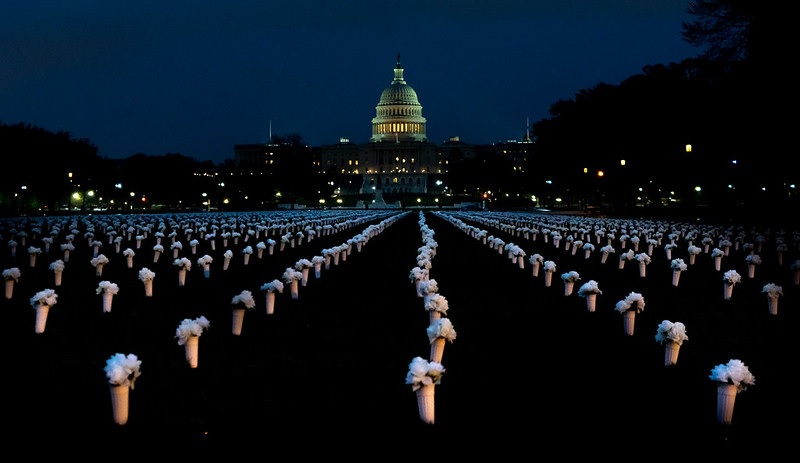Going on outdoor walks without a mask. Hopping on a Washington, D.C. Metro train without holding my breath. Meeting friends at restaurants and bars … Resuming those and other parts of my pre-pandemic life has been fun.
It’s also been scary — and not for reasons related to COVID-19. I’m Asian American, which can make being in public dangerous.
My fears are not unfounded: The FBI reported that, in 2020, the number of recorded hate crimes was at its highest in 12 years, propelled, in part, by increased attacks on Asian and Black people. The number of hate crimes targeting Asian people rose from 158 to 274, a more than 70% increase.
The COVID-19 Hate Crimes Act President Biden signed into law in May does help. Among other provisions, it assigns a point-person at the U.S. Department of Justice to expedite the review of COVID-19-related hate crimes; provides financial support for state and local law enforcement agencies to respond to these hate crimes; and coordinates with local and federal partners to fight back against racially discriminatory language being used to describe the pandemic.
The proposed Disarm Hate Act, introduced in the Senate in May and currently awaiting a vote, goes even further in tackling the issue. It prohibits the sale of firearms to or possession of firearms by anyone previously convicted of a hate crime.
U.S. gun ownership is No. 1 in the world and double that of No. 2, the Falklands
Easy availability of guns is part of what drives violence. Alongside Guatemala and Mexico, the United States is among three nations whose constitutions protect the right to own firearms, according to the World Population Review. It’s 2021 analysis lists the United States as the world leader in gun-ownership, counting 120.5 firearms per 100,000 people. Second runner-up was the Falklands, with 62.1 firearms per 100,000 people. Additionally, a 2020 analysis that had not been peer-reviewed by independent researchers found that firearm purchases and gun violence both spiked in the spring of 2020.
Keeping guns away from those who have committed hate crimes — those who have shown themselves to be violent actors — is an easy step toward averting what happened, for example, in Atlanta last March. A white man murdered eight people — six of whom were Asian women — with a 9-millimeter handgun. He’d bought it just hours beforehand. Gun violence prevention advocates have posited that mandated waiting periods between the time when a gun is sold and when the purchaser can actually obtain it could help to cut down on crimes like that one. Currently, 10 states and the District of Columbia require waiting periods for firearm purchases. While waiting periods are an example of one policy that could combat the gun violence epidemic, it is far from the only solution needed.
The COVID-19 Hate Crimes Act and the proposed Disarm Hate Act, should it become law, establish an initial framework for holding those who commit hate crimes accountable, but only after the fact. If we want to stop hate crimes, we need to work on prevention too. Prevention efforts might mean community conversations and events promoting racial inclusion and debunking the kinds of mythology prompting those who commit hate crimes to believe conspiracy theorists and rabid politicians when they spouted stuff about a “China virus.”
To prevent race-based gun violence, let’s have conversation in communities
But prevention also means broader reform of laws governing who sells and owns guns. To start, Congress should pass the proposed Bipartisan Background Checks Act of 202 and the proposed Enhanced Backgrounds Checks Act. National lawmakers should institute an assault weapons ban and implement extreme risk-protection orders that have been requested by law enforcement officials or family members concerned that a person will use a gun to do self-harm or harm someone else.
Throughout this pandemic, my mother has sent me news articles detailing the beatings of Asian elders, acid thrown on a random Asian woman and verbal assaults against Asian people just trying to go about their normal days amidst a pandemic. I keep those news clips saved on my phone. I re-read them occasionally. They fuel my activism, and remind me of the need to fight back against hate and violence in all of their forms.
My generation of Asian Americans was promised a post-racial America, one far removed from the xenophobia our parents and grandparents experienced as immigrants to this country. That promise, thus far, has proven to be a lie. But I have hope for my generation and for what it can help this nation achieve. We, in Gen Z, are comparatively more progressive and more ethnically diverse than the generations before us. We may have inherited a culture of racism and xenophobia, but we don’t have to accept it.
And some of us haven’t. This past year has given rise to a new wave of young Asian American activists set on changing how the Asian American community is treated. As a college student, an activist and a vocal member of Generation Z, I am part of this movement. I bear witness to the rage and the hurt that drives us forward. And as I walk down the street, as I ride on the Metro, as I experience the joy and the anxiety of reopening this economy and this society, I carry with me a hope that my generation will help us to get closer to a post-racial America that has far, far fewer guns.
Phoebe Suh, a Generation Progress intern, is majoring in women, gender and sexuality studies at Harvard University.
































